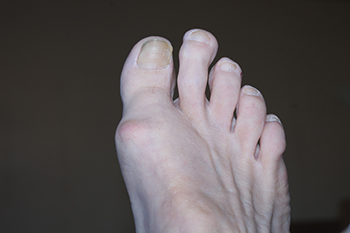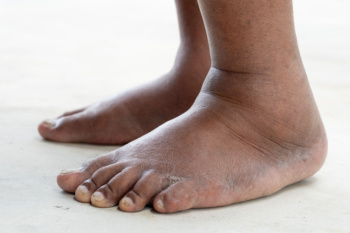
Morton’s toe is a common foot condition where the second toe is longer than the big toe. This structural variation can cause an uneven distribution of weight while walking or standing, leading to foot pain and discomfort. People with Morton’s toe may experience symptoms such as pain in the ball of the foot, calluses, or corns between the toes. The longer second toe may also cause imbalance and increased pressure on certain areas, resulting in fatigue or aching feet. A podiatrist can assess your foot structure and recommend treatments like custom orthotics to redistribute pressure, proper footwear to accommodate toe length, and exercises to strengthen foot muscles. Early intervention can help to reduce pain and prevent further complications. If you have this condition, it is suggested that you schedule an appointment with a podiatrist who can offer effective relief solutions.
Toe pain can disrupt your daily activities. If you have any concerns, contact one of our podiatrists of PA Foot & Ankle Associates. Our doctors can provide the care you need to keep you pain-free and on your feet.
What Causes Toe Pain?
Most severe toe pain is caused due to a sports injury, trauma from dropping something heavy on the toe, or bumping into something rigid. Other problems can develop over time for various reasons.
Toe pain can be caused by one or more ailments. The most common include:
- Trauma
- Sports injury
- Wearing shoes that are too tight
- Arthritis
- Gout
- Corns and calluses
- Hammertoe
- Bunions
- Blisters
- Ingrown toenails
- Sprains
- Fractures (broken bones)
- Dislocations
When to See a Podiatrist
- Severe pain
- Persistent pain that lasts more than a week
- Signs of infection
- Continued swelling
- Pain that prevents walking
Diagnosis
In many cases the cause of toe pain is obvious, but in others, a podiatrist may want to use more advanced methods to determine the problem. These can range from simple visual inspections and sensation tests to X-rays and MRI scans. Prior medical history, family medical history, and any recent physical traumatic events will all be taken into consideration for a proper diagnosis.
Treatment
Treatments for toe pain and injuries vary and may include shoe inserts, padding, taping, medicines, injections, and in some cases, surgery. If you believe that you have broken a toe, please see a podiatrist as soon as possible.
If you have any questions please feel free to contact one of our offices located in Allentown, Easton, Northampton, and Chew Street in Allentown, PA . We offer the newest diagnostic tools and technology to treat your foot and ankle needs.

Foot pain can stem from a variety of causes, each affecting movement and comfort. Contusions may result from blunt trauma, causing swelling and discoloration, and may happen following an ankle sprain. Puncture wounds can lead to deep tissue damage and infection, if untreated. Ligament injuries often cause joint instability, while tendon injuries may limit flexibility and strength. Sprains stretch or tear the soft tissue around joints, leading to pain and reduced function. Each condition requires careful evaluation to prevent long-term complications. A podiatrist can diagnose the source of pain, provide targeted treatment, and guide recovery through footwear advice or minor procedures. If you are experiencing persistent or sharp foot or ankle pain, it is suggested that you consult a podiatrist for an accurate diagnosis and treatment.
Foot Pain
Foot pain can be extremely painful and debilitating. If you have a foot pain, consult with one of our podiatrists from PA Foot & Ankle Associates. Our doctors will assess your condition and provide you with quality foot and ankle treatment.
Causes
Foot pain is a very broad condition that could be caused by one or more ailments. The most common include:
- Bunions
- Hammertoes
- Plantar Fasciitis
- Bone Spurs
- Corns
- Tarsal Tunnel Syndrome
- Ingrown Toenails
- Arthritis (such as Gout, Rheumatoid, and Osteoarthritis)
- Flat Feet
- Injury (from stress fractures, broken toe, foot, ankle, Achilles tendon ruptures, and sprains)
- And more
Diagnosis
To figure out the cause of foot pain, podiatrists utilize several different methods. This can range from simple visual inspections and sensation tests to X-rays and MRI scans. Prior medical history, family medical history, and any recent physical traumatic events will all be taken into consideration for a proper diagnosis.
Treatment
Treatment depends upon the cause of the foot pain. Whether it is resting, staying off the foot, or having surgery; podiatrists have a number of treatment options available for foot pain.
If you have any questions, please feel free to contact one of our offices located in Allentown, Easton, Northampton, and Chew Street in Allentown, PA . We offer the newest diagnostic and treatment technologies for all your foot care needs.

Leg and ankle swelling, also known as edema, can result from a variety of causes, including circulation problems, injury, prolonged sitting, or underlying health conditions. It may feel tight, heavy, or uncomfortable, and the skin can appear stretched or shiny. Simple steps like elevating the legs, wearing compression socks, and reducing salt intake can sometimes bring relief. However, persistent or worsening swelling may signal something more serious. Conditions such as vein disease, heart issues, or lymphatic problems can all contribute to fluid buildup in the lower limbs. Because untreated edema can lead to skin damage, discomfort, or infection, ongoing swelling should never be ignored. If you notice puffiness that does not improve or comes with other symptoms, it is suggested that you see a podiatrist for an in-depth evaluation and the right course of treatment.
Swollen feet can be a sign of an underlying condition. If you have any concerns, contact one of our podiatrists of PA Foot & Ankle Associates. Our doctors can provide the care you need to keep you pain-free and on your feet.
Swollen feet are a common ailment among pregnant women and people who stand or sit for extended periods. Aging may increase the possibility of swollen feet and patients who are obese often notice when their feet are swelling too. There may be medical reasons why swollen feet occur:
- Phlebitis - A condition that causes the veins to become inflamed and can also cause leg pain.
- Liver disease - This may lead to low blood levels of albumin which is a protein. This can cause fluid in the blood to pass into the tissues and several areas of the body can become swollen.
- Heart failure - When the heart doesn’t pump properly the blood that is normally pumped back to the heart can pool in the veins of the legs causing swollen feet.
- Kidney disease - One of the main functions of the kidneys is releasing excess fluid in the body. This type of condition can make it difficult for the kidneys to function properly, and as a result the feet may become swollen.
- Deep-vein thrombosis (DVT)- This is a serious condition where blood clots form in the veins of the legs. They can block the return of blood from the legs to the heart which may cause the feet to swell. It is important to be treated by a podiatrist if this condition is present.
Swollen feet can also be caused by bone and tendon conditions, including fractures, arthritis, and tendinitis. Additionally, there may be skin and toenail conditions and an infection may cause the feet to swell. Patients who take medicine to treat high blood pressure may be prone to getting swollen feet.
Many patients elevate their feet to help relieve the swelling and this is generally a temporary remedy. When a podiatrist is consulted the reason behind the swelling can be uncovered and subsequently treated.
If you have any questions please feel free to contact one of our offices located in Allentown, Easton, Northampton, and Chew Street in Allentown, PA . We offer the newest diagnostic tools and technology to treat your foot and ankle needs.

